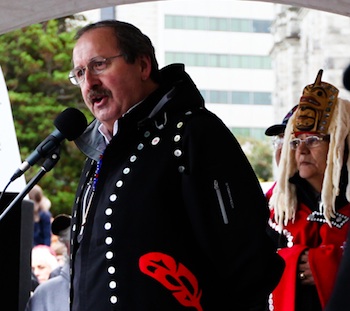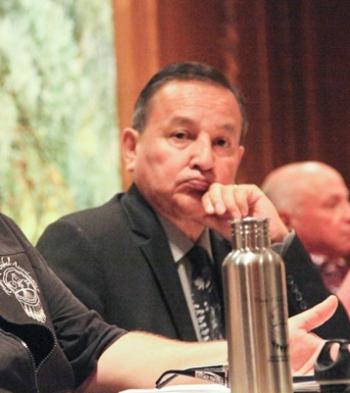Image Caption
Shari Narine
Windspeaker Contributor
PRINCE RUPERT, B.C
Indigenous leaders are blasting Prime Minister Justin Trudeau for talking big, but not backing up his words with actions, following the federal government’s announcement Sept. 27 that Pacific NorthWest’s liquefied natural gas project had been approved.
That approval comes on the heels of the nod being given to another much-contested B.C. project, the Site C dam.
Grand Chief Stewart Phillips, of the Union of British Columbia Indian Chiefs, and Art Sterritt, spokesperson for the Gitga’at First Nation, say the approval does not bode well for what Trudeau is claiming to be a changed relationship with Indigenous peoples.
“I’m deeply disappointed,” said Phillips. “There are enormous contradictions inherent in what the prime minister says and what he does. He’s well known for making lofty eloquent statements and giving expression to public platitude for the need to pursue justice for the Indigenous peoples of this country, but on the other hand, at every opportunity, he does exactly the opposite.”
“The tanker ban in the north is something near and dear to the Gitga’at people … It’s something we think we’ve got pretty good commitments out of the federal government on and particularly the prime minister. But Site C dam, Petronas, where are we? Do they feel that it’s good enough to perhaps agree with First Nations and British Columbians on one project while they bomb us on three others? That’s not a very good average,” said Sterritt.
Environment Minister Catherine McKenna made the announcement in Vancouver. The $11.4-billion terminal, to export LNG from northern British Columbia, comes with 190 conditions that must be met. The project is led by Malaysia’s state-owned Petronas.
Phillips and Sterritt, neither of whom has fully studied those conditions, view them differently.
Phillips sees them as “representing 190 potential lawsuits.”
While Sterritt is disappointed that the government did not make this “a better project,” he is optimistic that the established conditions will allow First Nations to work with Petronas to “push the company to do things better.” Specifically, he would like to see the carbon emissions drop from the approved .22 to .16.
‘This is a project that is going to be right on my doorstep – I live in Prince Rupert – that’s right in the middle of the Great Bear (Rainforest) and it’s probably going to have the most toxic technology that you can have for liquefying natural gas,” said Sterrit. “And in this day and age when you have better technology, that’s really, really disappointing.”
He would also like to see the export terminal moved from Lelu Island to Ridley Island. First Nations, fishermen, and environmental groups have expressed concern that the terminal on Lelu Island would threaten juvenile salmon habitat in the Skeena River estuary.
“There are ways (Petronas) could improve this project so it would be more palatable,” said Sterritt.
He points to the Shell-backed LNG project approved in Kitimat. While the development has been put on hold for market reasons, Sterritt says Shell set some high benchmarks and could be in the situation where they have carbon offsets to sell to other industries.
“The social license could be obtained, not just from the environmental community but from First Nations perhaps in the Skeena and other areas. I’m hoping that we have the opportunity to address that. I hope that Petronas takes the opportunity to show themselves to be good corporate citizens and do this the way it can be done. Do it better,” he said.
But Phillips doesn’t believe that Petronas will make any changes to its project on its own.
“I don’t think Petronas itself has a stellar reputation of strong business ethics, being overly concerned about the natural values and environmental protection. Rather they’re entirely focused on profit,” he said.
“This is going to become an extremely litigious campaign from this point forward,” he said. “We’re definitely heading back to the court room in relation to this decision and development.”
How quickly that court action will come is still not clear.
Phillips says legal strategizing will take place and will be balanced by whether or not Pacific NorthWest LNG decides to go ahead with the development. Right now, global LNG markets are experiencing a surplus of supply and low prices.
The consortium’s president, Adnan Zainal Abidin, said in a release that they were pleased with the government’s decision.
“Moving forward, Pacific NorthWest LNG and our shareholders will conduct a total project review over the coming months prior to announcing next steps for the project,” said Abidin.

Art Sterritt, spokesperson for the Gitga’at First Nation (photo:file)

